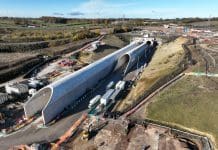UK construction output fell at the fastest rate ever in April, as suddenness of the drop ‘knocks the wind’ out of building work in the UK, according to the latest construction PMI
April data indicated by far the fastest decline in UK construction output since the survey began 23 years ago.
Most survey respondents (86%) reported a reduction in business activity since March, mirroring widespread site closures and shutdowns across the supply chain in response to the Covid-19 pandemic.
The headline seasonally adjusted IHS Markit/CIPS UK Construction Total Activity Index fell from 39.3 in March to 8.2 in April, to signal a rapid downturn in overall construction output.
The latest construction output reading was the lowest since data were first collected in April 1997. The previous record low was 27.8 in February 2009.
Construction work
All three main categories of construction work experienced a survey-record fall during April, with declines in house building (7.3) and commercial activity (7.7) exceeding that for civil engineering (14.6).
Lower volumes of construction output were almost exclusively attributed to business closures in April, with survey respondents often commenting on complete stoppages of activity on site due to the coronavirus pandemic.
Supply shortages
April data also highlighted a severe impact on construction supply chains, with closures at builders’ merchants and stoppages of manufacturing production leading to widespread supply shortages.
The latest lengthening of average lead times for the delivery of construction products and materials was by far the steepest since the survey began in April 1997. Around three-quarters of the survey panel reported longer delivery times from suppliers during April, with a lack of availability for safety products also frequently reported by construction companies.
New business volumes fell at a rapid pace in April, with the downturn by far the steepest recorded in more than two decades of data collection. Construction companies commented on the suspension of contract awards due to business closures among clients, as well as uncertainty about the duration of stoppages on site and feasibility of starting new projects.
Construction firms also reported that staffing had dropped sharply in April, with employees often placed on furlough leave until work on site could recommence with social distancing measures. The data also indicated the steepest decline in subcontractor usage in the survey history.
Business expectations for the year ahead dropped slightly since March and equalled the survey-record low seen in October 2008. Construction firms widely noted concerns beyond simply reopening sites, including cash flow difficulties across the supply chain, rising costs and severely reduced productivity.
Long-term supply chain disruption
Tim Moore, economics director at IHS Markit, commented: “The rapid plunge in UK construction output during April stands out even in a month of record low PMI data for the manufacturing and service sectors. Widespread site closures and business shutdowns across the supply chain meant that vast swathes of the construction sector halted all activity in response to the Covid-19 pandemic.
“Around 86% of survey respondents reported a fall in business activity since March, while only 3% signalled an expansion. Housebuilding and commercial work were unsurprisingly the hardest hit, but civil engineering activity also fell at by far the fastest pace since the survey began in April 1997.
“A drop in construction activity of historic proportions in April looks set to be followed by a gradual reopening of sites in the coming weeks, subject to strict reviews of safety measures.
“However, the prospect of severe disruption across the supply chain will continue over the longer-term and widespread use of the government job retention scheme has been needed to cushion the impact on employment. Looking ahead, construction companies widely commented on worries about cash flow, rising operating costs and severely reduced productivity, as well as a slump in demand for new construction projects.”
Industry reaction
Hannah Vickers, chief executive of the Association for Consultancy and Engineering (ACE), said: “The figures are hardly surprising, but not withstanding the use of a cliché, there is light at the end of the tunnel.
“Recent news on HS2 provided a welcome psychological boost to the industry and with Government focus turning to the recovery, I am sure our sector will be recognised as a key catalyst for the wider economy.
“I hope that this will translate to ongoing support as we work together to develop a recovery plan for the UK underpinned by a strong pipeline of projects to help the country back to growth.”
Ragene Raithatha, construction & infrastructure senior associate at DWF, commented: “Covid-19 has severely impacted the sector which has resulted in the fastest decline in UK construction output since the survey began 23 years.
“The sector has taken a blow as the Covid-19 pandemic has taken it by surprise. Uncertainty around site operations, given the need to meet social distancing requirements and safeguard employees coupled with shortage of supplies has led to much disruption on sites.
“For the near future, the market is likely to become more contentious. Contractors will be alive to putting a line in the sand in relation to potential extension of time claims. Employers and contractors may seek to review contracts with a view to pricing and completion dates.
“They may also question whether the UK will need to look to a more localised supply chain for construction materials and workforce in the future.
“Currently it is very difficult to predict what the future will bring but there will hopefully be brighter times ahead.”













![[VIDEO] Cambridge waste water plant granted permission to relocate Artist impression of the new Cambridge waste water plant and surrounding land](https://www.pbctoday.co.uk/news/wp-content/uploads/2025/04/p.151-768x364-1-218x150.jpg)
